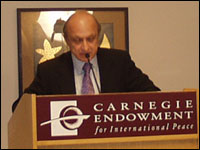Registration
You will receive an email confirming your registration.
IMGXYZ469IMGZYXOn March 6, 2006, the Carnegie Endowment for International Peace hosted a meeting entitled “Armenia’s Economic Reforms: Results and Challenges,” with Vahram Nercissiantz, Chief Economic Advisor to the President of Armenia. Senior Associate Martha Olcott chaired the session.
The question and answer period is summarized below.
Q&A
Q: What price will Armenia pay for Russian gas?
A: We expect to pay world prices. The suddenness of the change did surprise us, and a gradual adjustment would have been better for the Armenian economy. But eventually we need to go to the market price. Inflation will be up, but remain in the single digits. We are talking to Russia about smoothing the transition.
Q: Has Armenia agreed to sell assets to Gazprom in exchange for a lower price?
A: We will not compromise our energy diversification strategy by sale of Armenian distribution assets to any single source. There are talks on production assets.
Q: Will there be a railroad to Iran?
A: There is no such plan at this stage.
Q: What are Armenia’s economic integration priorities?
A: Our priority is economic integration with Europe. We have been granted neighborhood status.
Q: Can you tell us about the Millennium Challenge Account in Armenia?
A: Armenia recently signed its MCA compact at the State Department. Its focus is the rural sector, particularly infrastructure. Improvements here will encourage agricultural productivity and reduce poverty through growth. The MCA provides resources to implement this strategy.
Q: If successful, will rural development reduce reliance on remittances?
A: For the first time last year Armenia had more people coming than leaving. Urban life is now more “fun” in Yerevan. People come from Moscow, the US, etc. Real estate prices are rising. Construction is growing at thirty to forty percent per year.
Q: What about the WTO and exports?
A: In the old days most of Armenia’s trade was with Russia. Now it’s diverse, one third with Russia and the CIS, one third with the US, and one third with Europe. We acceded to the WTO two or three years ago. This has been very helpful. There was no conditionality. Now Armenia has only two tariffs: zero percent and ten percent. There are no quotas. Trade is growing at a double-digit rate, though there is still a current account deficit because Armenia is importing capital goods. Now Armenia exports more high-tech goods and less wine and cognac. The blockades hurt the economy, but Armenia is able to export anyway. Thanks to information technology it is possible to export via the internet and by satellite. We hope to resolve these conflicts and share growth with our neighbors.
Q: What are Armenia’s major political problems now? Problems with neighbors? The size of the grey economy? Tax reform?
A: We have good relations with Georgia and Russia, and also with Iran and the Arab world. Azerbaijan is a problem because of the border disputes. Turkey is behaving like a Turkic power, not a regional power. But we aspire to peaceful and friendly relationships with all our neighbors. The grey economy is largely remittances and small businesses. It’s not cost-effective to stop it, though it is significant enough to make a difference in the Gini coefficient.
Q: What is Armenia’s relationship with Iran? Is there a pipeline being built from Iran?
A: Armenia’s policy is energy diversification. The new pipeline won’t change our relationship with Russia. One day we hope to buy energy from Azerbaijan also.
Summary prepared by Matthew Gibson, Junior Fellow with the Russian and Eurasian Program at the Carnegie Endowment for International Peace.
